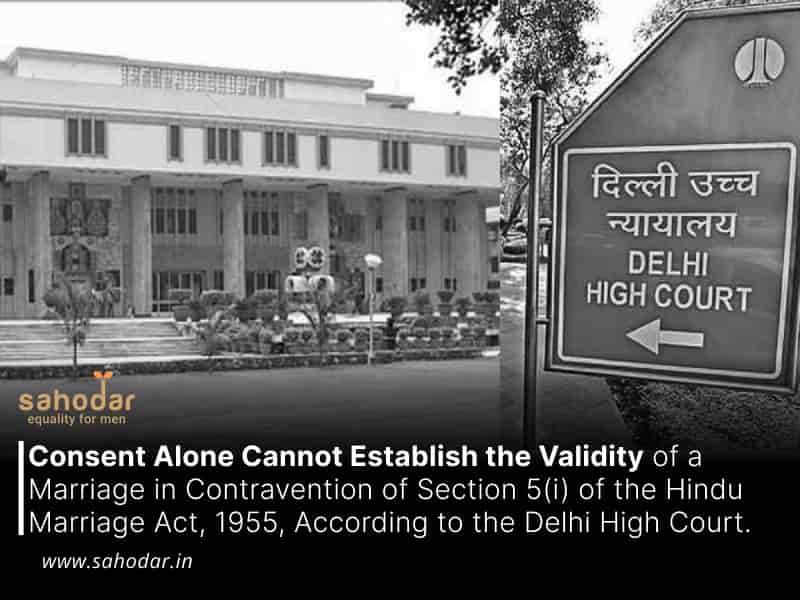“The very fact that the wife had not only claimed but also accepted pendente lite maintenance during the appeal from the first husband fortifies that the marriage was not finally dissolved.”
Delhi High Court: In the case at hand, an appeal brought under Section 19 of the Family Courts Act, 1984, contested a judgment rendered on 29-11-2017. The judgment in question had decreed the nullity of the marriage between the parties under Section 11 of the Hindu Marriage Act, 1955 (HMA). The court opined that the mere consent of the parties could not imbue legality upon a marriage that contravenes the stipulations delineated in Section 5(i) of the HMA, when there exists a legal impediment to a second marriage. Furthermore, the court underscored the wife’s acceptance of interim maintenance during the pendency of an appeal filed by her first husband, indicating that the first marriage had not been definitively dissolved. Accordingly, the court affirmed the Family Court’s decision to declare the marriage null and void under the HMA, and subsequently dismissed the appeal.
Case Background:
In the present case, the parties solemnized their marriage on 28-04-2009 in accordance with Hindu customs and rituals. The appellant-wife had previously contracted a marriage, which was judicially dissolved on 31-03-2008. However, her former spouse lodged an appeal against the divorce decree. The wife became cognizant of this pending appeal in December 2008, yet the appeal was withdrawn more than four years later, on 22-07-2012.
On account of marital discord in their second union, the husband initiated legal proceedings under Section 11 of the HMA, seeking a declaration of nullity for the marriage. His contention rested on the assertion that the wife’s first marriage remained subsisting due to the pending appeal, rendering their second marriage legally void.
The Family Court, in its judgment of 29-11-2017, deduced that in view of the appeal pending against the wife’s initial divorce decree at the time of her second marriage, the latter was in conformity with the provisions of the HMA. Consequently, the court pronounced the marriage null and void under Section 11 of the HMA and annulled the marriage.
Subsequently, the wife lodged the present appeal.
Legal Analysis and Decision:
The court acknowledged the wife’s admission, given in her testimony, that she was aware of the pending appeal prior to her second marriage on 28-04-2009. The wife posited that the husband was also cognizant of the appeal’s status before their matrimonial alliance and that he assured her that the appeal’s pendency would not obstruct their marriage.
In light of Section 23 of the HMA, which restricts a party from benefiting from their own misconduct, the court deliberated on whether the consent of the parties could obviate a legal restraint. The court expounded that when the HMA’s provisions, particularly Section 5(i), are infringed, the marriage is rendered void under Section 11. It emphatically enunciated that where a legal prohibition exists with respect to a second marriage, the mutual consent of the parties cannot confer legality upon a marriage that contravenes the conditions specified in Section 5(i) of the HMA.
The court drew upon the precedent established in the case of Chandra Mohini Srivastava v. Avinash Prasad Srivastava, AIR 1967 SC 581. This legal authority delineated that pursuant to Section 15 of the HMA, a spouse may contract a lawful remarriage only once the time period for filing an appeal has elapsed or the appeal itself has been dismissed. In the present case, the parties contracted their marriage while the appeal was still pending, and this fact was mutually acknowledged. Given that the dissolution of the first marriage was not conclusively established at the time of the second marriage, in conformity with Section 15 of the HMA, the marriage that took place on 28-04-2009 was in contravention of Section 5(i) of the HMA.
The court also underscored that the wife had sought and received interim maintenance from her former husband during the pendency of the appeal. This aspect further underscored that her first marriage had not been definitively dissolved.
In summation, the court affirmed the Family Court’s ruling that the marriage was correctly declared null and void under the HMA, and subsequently dismissed the appeal.

